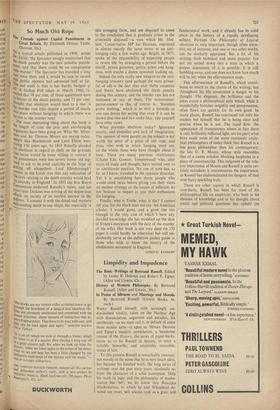So Much Old Rope
The Crusade against Capital Punishment in Great Britain. By Elizabeth Orman Tuttle. (Stevens, 30s.) IN a typical article published in "1908; writes Dr, Tuttle, 'the Spectator smugly maintained that the death penalty was the best possible punish- roent, and that there could be no compromise With murder.' The Spectator has travelled a long way since then, and it would be nice to record that public opinion had advanced half as far. The sad truth is that it has hardly, budged at all.A Gallup Poll taken in March, 196Q, re- Yealed that 78 per cent. of those questioned were 1,2 favour of the death penalty, and 73 per cent. thought that abolition would lead to a rise in (vi .111( murder rate (this despite a period of nearly o years without hangings in which there WAS 110 rise in the murder rate). The most depressing thing about this book is tile length of time the pro- and anti-hanging arguments have been going on. What Mr. Silver- Than and Sir Thomas Moore are saying today. People like Mackintosh and Lord Eldon were raYing 150 years ago. In 1810 Romilly pleaded i°1 abolition in regard to theft on the grounds that juries would be more willing to convict if e Punishment were less severe (some old lags used to ask to be tried capitally in the hope of Betting off altogether). Lord Ellenborough" atoswer in the Lords was that any relaxation of !He laws relating to the death penalty would lead ,!,0 anarchy in England.' In 1833 the first Royal -.eirnmission endorsed Romilly's views, and ten Years later Dickens was writing of the deleterious e8ects on society of its morbid interest in the '1 connect it with the dread and mystery surrounding death in any shape, but especially in this avenging form, and am disposed to come to the conclusion that it produces crime in the criminally disposed'—a view which Mr. Mat- hew. Conservative MP for Honiton, expressed in almost exactly the same terms at an anti- hanging rally a few weeks ago. Bright, in 1877, spoke of the impossibility of expecting people to revere life 'by strangling a person before the sheriff, prison governor, police, priest and hang- man, with maybe a dozen newsmen looking on.
Indeed the only really new weapon in the anti- hanging armoury (and perhaps the most power- ful of all) is the fact that over thirty countries and States have abolished the death penalty during this century, and the murder rate has not increased in any of them. The retentionists' parrot-answer to this, of course, is: 'Statistics prove nothing,' which is as nice a formula as you can devise for saying that even if it can be shown that two and two make four, you yourself have other views.
What prevents abolition today? Ignorance mostly, and prejudice and lack of imagination. The opinion of most people on the subject is not worth the price of a piece of old rope, and those who wish to retain hanging most are, on the whole, those who have thought about it least. There are many previous retentionists (Chuter Ede, Gowers, Templewood) who, after years of study and thought, have moved over to an abolitionist position. No one of note has, so fa: as I know; travelled in the opposite direction. Yet it is astonishing how many people who would think twice before giving you their views on nuclear strategy or the causes of inflation, do
not hesitate to impart to you their enthusiasm for hanging.
Finally, who is Tuttle, what is she? I cannot
tell you, for the blurb does not say. An American scholar, I would guess, and a good one too (though in the only case of which I have any detailed knowledge she has muddled up the date of Evans's execution with the date of the murder of his wife). Her book is not very deep (in 150 pages it could hardly be otherwise) but will un- doubtedly serve as the definitive pocket guide :o those who wish to know the history of the abolitionist movement in England.
LUDOVIC KENNEDY






































 Previous page
Previous page